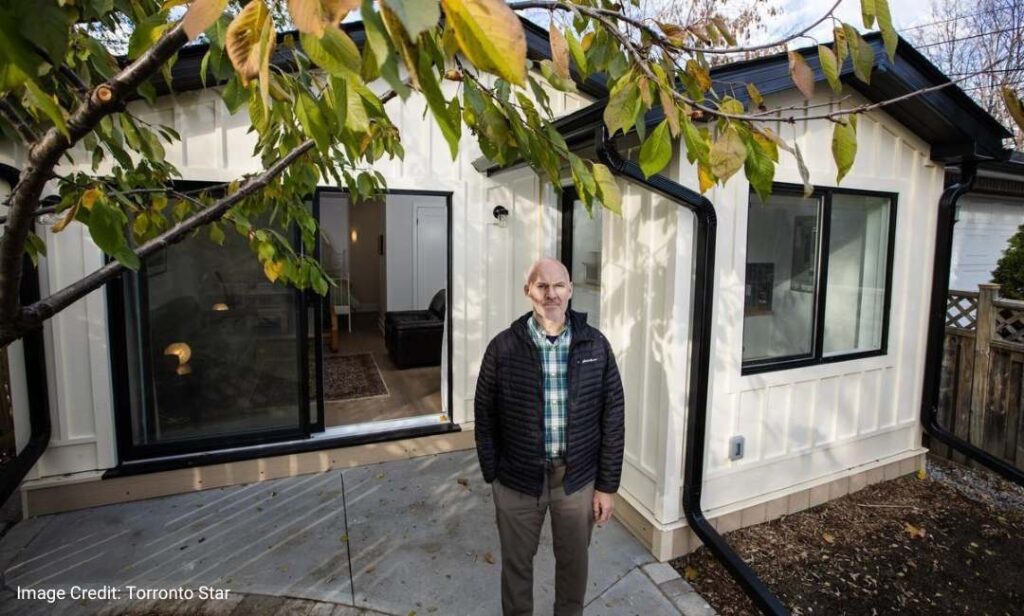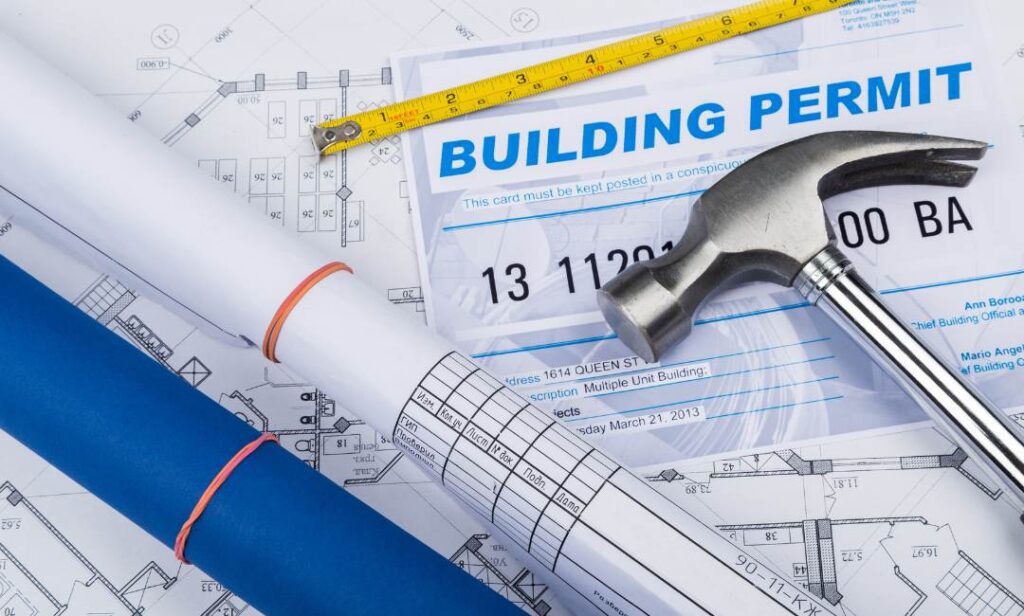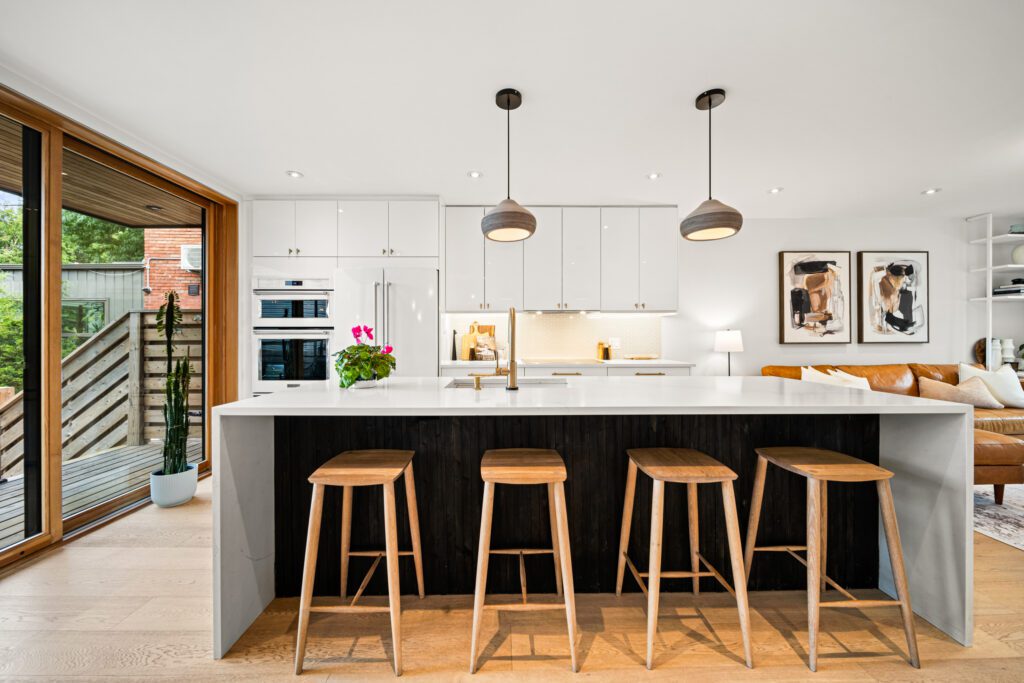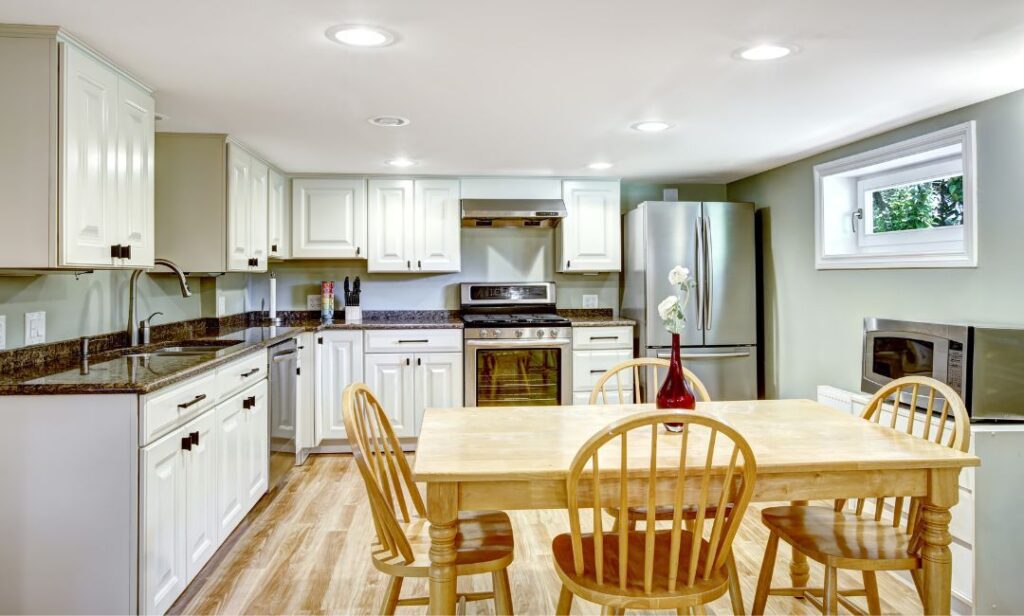Discover Garden Suites: Expanding Urban Living in Toronto
06/24/24

Imagine transforming your backyard into a beautiful, self-contained living space that can generate income, provide housing for family members, or serve as a versatile guest house. Welcome to the world of Garden Suites in Toronto. As urban living evolves, these secondary homes are becoming a popular choice for homeowners looking to maximize their property’s potential.
What is a Garden Suite?
Definition and Key Characteristics
A Garden Suite is a detached, self-contained residential unit located in the backyard of a primary residence. Unlike laneway houses, which are typically built adjacent to a laneway, Garden Suites are situated within the garden or backyard space. They offer all the amenities of a standard home, including a kitchen, bathroom, living area, and bedroom, making them ideal for various uses.
Comparison with Laneway Houses
While both Garden Suites and laneway houses are accessory dwelling units (ADUs) designed to increase housing density and provide flexible living options, their placement and regulations differ. Garden Suites are positioned within the backyard of a property without direct access to a laneway, whereas laneway houses are built facing a rear laneway. This distinction affects design possibilities, accessibility, and sometimes the regulatory process.
Recent Regulations in Toronto
In response to Toronto’s housing needs, the city introduced streamlined regulations for Garden Suites to simplify the approval process. These regulations outline specific requirements for size, height, setbacks, and emergency access, making it easier for homeowners to plan and build these secondary units.
Current Statistics on Garden Suite Development
Since the introduction of new regulations, there has been a growing interest in Garden Suites. As of the latest updates, numerous permits have been issued, and many applications are in progress. This trend indicates a rising acceptance and implementation of Garden Suites as a viable housing solution in Toronto.
Why Build a Garden Suite?
Building a Garden Suite on your property offers a multitude of benefits that can significantly enhance your lifestyle, financial stability, and property value. Here’s a detailed look at why you might consider this innovative housing solution.
Additional Income
Potential Rental Income
One of the primary advantages of building a Garden Suite is the potential for generating additional rental income. In a high-demand rental market like Toronto, a well-designed Garden Suite can command substantial rental rates, providing a steady and reliable source of income. Whether you opt for short-term rentals through platforms like Airbnb or long-term leases, the financial benefits can be significant. This extra income can help cover mortgage payments, fund home improvements, or provide a financial cushion for other investments.
Tax Deductions on Mortgage Interest
If you finance the construction of your Garden Suite with a loan on your primary residence, you may be eligible for tax deductions on the mortgage interest. This can reduce your taxable income, making the investment more affordable. Consult with a tax advisor to understand the specific deductions available and how they can benefit your financial situation.
Increased Property Value
Enhanced Attractiveness to Potential Buyers
A Garden Suite not only provides immediate financial benefits but also enhances the overall attractiveness of your property to potential buyers. Prospective homeowners are often drawn to properties with additional living spaces, seeing them as versatile and valuable additions. Whether used as rental units, guest houses, or private retreats, Garden Suites make your property stand out in a competitive market.
Higher Resale Value
Properties with Garden Suites generally command higher resale values. The additional living space and potential for rental income make your home more desirable, allowing you to set a higher asking price. This can be particularly advantageous in Toronto’s booming real estate market, where unique features can significantly boost property values. An investment in a Garden Suite can yield substantial returns when you decide to sell your property.
Flexible Living Arrangements
Housing for Family Members
Garden Suites offer flexible living arrangements that can adapt to your family’s changing needs. They provide a perfect solution for multi-generational living, allowing family members to stay close while maintaining their independence. Whether it’s a space for elderly parents, adult children, or extended family, a Garden Suite can accommodate various family dynamics. This setup ensures that loved ones are nearby without compromising privacy.
Home Office or Guest House
In today’s world, where remote work is becoming increasingly common, having a dedicated home office is invaluable. A Garden Suite can serve as an ideal workspace, offering a quiet, separate environment that enhances productivity and work-life balance. Additionally, Garden Suites make excellent guest houses, providing friends and family with a comfortable and private place to stay. This is particularly useful during holidays, special occasions, or extended visits.
Urban Density Solutions
Contribution to Solving Urban Housing Shortages
Garden Suites contribute to solving urban housing shortages by increasing the density of existing neighborhoods without altering their character. By adding additional units to pre-existing lots, they provide much-needed housing options without the need for extensive new developments. This approach helps accommodate the growing population while preserving the community’s aesthetic and charm.
Efficient Use of Existing Land
Building a Garden Suite is an efficient use of existing land. It maximizes the potential of your property, transforming underutilized spaces like backyards into functional living areas. This sustainable approach to urban development reduces the need for new land and infrastructure, promoting more eco-friendly and resource-efficient growth. By utilizing space that might otherwise remain underused, Garden Suites help cities grow sustainably.
Short-Term and Long-Term Rental Options

When building a Garden Suite, one of the most critical decisions you’ll make is how to utilize the space for rental purposes. Understanding the benefits and challenges of both short-term and long-term rental strategies can help you maximize your investment and meet your specific goals.
Short-Term Rentals (e.g., Airbnb)
Advantages
1. Higher Income Potential
Short-term rentals often command higher nightly rates compared to long-term leases. In a bustling city like Toronto, which attracts tourists, business travelers, and event attendees year-round, a well-furnished and strategically located Garden Suite can achieve high occupancy rates and substantial income. During peak seasons, such as summer or major city events, the rental rates can be significantly higher, boosting your overall earnings.
2. Flexibility
Renting out your Garden Suite on a short-term basis provides you with considerable flexibility. You can choose to rent the unit when it suits your schedule and keep it available for personal use when needed. This means you can accommodate visiting family or friends, use the space yourself during certain times of the year, or even switch to long-term renting if your circumstances change.
3. Less Wear and Tear
Short-term rentals generally result in less wear and tear on your property. Guests typically stay for a few days to a week, which means the turnover is high, but the intensive use of the space is lower compared to a long-term tenant. Regular cleaning between guests ensures that any minor issues are addressed promptly, keeping the property in good condition.
Considerations
1. Management
Managing short-term rentals can be time-consuming and demanding. You need to handle bookings, guest communication, cleaning, and maintenance frequently. This can be a significant commitment, especially if you are managing multiple properties. Hiring a property management service can alleviate some of these responsibilities, but it will also reduce your profit margin.
2. Regulations
Toronto has specific regulations for short-term rentals. Homeowners must register their properties and comply with rules regarding maximum rental days per year, insurance requirements, and guest limits. It’s essential to stay informed about local laws to avoid fines and ensure your rental remains compliant.
3. Occupancy Rates
Income from short-term rentals can be inconsistent, depending on seasonal demand and market conditions. It’s crucial to conduct thorough market research to estimate potential occupancy rates and adjust your pricing strategy accordingly. Understanding the local market dynamics can help you optimize your rental income throughout the year.
Long-Term Rentals
Advantages
1. Stable Income
Long-term rentals provide a steady and predictable income stream. Monthly rent payments offer financial stability, making it easier to plan and manage your finances. This stability is particularly beneficial if you rely on the rental income to cover mortgage payments or other significant expenses.
2. Less Management
Compared to short-term rentals, long-term rentals require less frequent management. Tenant turnover is lower, which means you don’t have to deal with the constant cycle of guest check-ins and check-outs. Maintenance and cleaning responsibilities are also reduced, as long-term tenants typically take better care of the property.
3. Tenant Relationships
Building relationships with long-term tenants can lead to a more harmonious rental experience. Tenants who stay for extended periods are more likely to treat the property with respect and communicate any issues promptly. A positive landlord-tenant relationship can result in fewer disputes and a more stable rental arrangement.
Considerations
1. Market Rates
Long-term rental rates are generally lower on a nightly basis compared to short-term rentals. However, the stability and reduced management effort often balance this out. It’s essential to set a competitive rent that reflects the market conditions and ensures you attract reliable tenants.
2. Tenant Screening
Finding reliable long-term tenants requires thorough screening processes. Conducting background checks, verifying employment, and checking references are crucial steps to ensure that tenants will respect the property and pay rent on time. A rigorous screening process helps minimize the risk of problematic tenants.
3. Lease Agreements
Drafting a comprehensive lease agreement is essential for long-term rentals. The lease should cover all aspects of the tenancy, including rent payment terms, maintenance responsibilities, rules for property use, and procedures for resolving disputes. A well-crafted lease protects both the landlord and the tenant and sets clear expectations.
Choosing the Right Strategy
Deciding between short-term and long-term rentals depends on your personal goals, lifestyle preferences, and the characteristics of your Garden Suite. Some homeowners may even choose a hybrid approach, renting their Garden Suite short-term during peak seasons and securing long-term tenants during off-peak periods.
Short-Term Rentals:
- Ideal for those seeking higher income potential and flexibility.
- Suitable if you have the time or resources to manage frequent turnover.
- Best in high-demand areas with strong tourism or business travel.
Long-Term Rentals:
- Ideal for those seeking stable, predictable income with less management effort.
- Suitable if you prefer lower tenant turnover and steady occupancy.
- Best in residential areas with strong demand for long-term housing.
Whichever strategy you choose, the Smith Proulx Team can provide valuable insights and support to help you maximize your Garden Suite investment. By understanding the benefits and challenges of each rental approach, you can make an informed decision that aligns with your financial goals and lifestyle preferences.
Challenges and Considerations

While building a Garden Suite offers numerous benefits, it also comes with its set of challenges and considerations. Being aware of these factors can help you navigate the process more smoothly and make informed decisions that ensure the success of your project.
Cost
Initial Construction Costs
Building a Garden Suite requires a significant financial investment. The costs can vary widely depending on factors such as the size, design complexity, and materials used. On average, construction costs start at around $300,000 and can go up from there. It’s crucial to create a detailed budget that includes all anticipated expenses, from design and permits to construction and landscaping. Having a contingency fund for unexpected costs is also essential to avoid financial strain during the project.
Financing Options
Securing financing for your Garden Suite project is a critical step. Canadian banks and credit unions offer various loan products tailored to homeowners building secondary units. It’s important to explore your options and find the best rates and terms that suit your financial situation. Consulting with a mortgage advisor can provide valuable insights and help you navigate the loan application process, ensuring you have a solid financial plan in place.
Regulations and Permits
Navigating Zoning Laws and Building Codes
One of the most challenging aspects of building a Garden Suite is navigating the complex web of zoning laws and building codes. Toronto has specific regulations that dictate where and how Garden Suites can be built. These regulations cover aspects such as size limits, height restrictions, and setback requirements. Ensuring compliance with these rules is crucial to obtaining the necessary permits and avoiding legal issues down the line.
Potential Bureaucratic Hurdles
Dealing with municipal bureaucracy can be time-consuming and frustrating. The process of securing permits and approvals can involve multiple steps and require detailed documentation. Potential delays and setbacks are common, so it’s important to be prepared for these challenges. Working with professionals who understand the regulatory landscape can help streamline the process and ensure that all requirements are met.
Impact on Property Taxes
How Property Value Assessment Changes
Adding a Garden Suite to your property will likely increase its assessed value, which in turn affects your property taxes. While the exact amount of the increase can vary, it’s essential to contact the city to get an estimate of how much more you’ll be paying. This information will help you budget for the ongoing costs associated with your new dwelling and avoid any surprises when your property tax bill arrives.
Estimating the Increase in Property Taxes
Understanding how your property taxes will change is crucial for financial planning. While the increase in property taxes is usually small relative to the rental income you can generate, it’s still an important factor to consider. Make sure to account for this additional expense in your overall budget to ensure that your investment remains financially viable.
Maintenance and Management
Ongoing Upkeep Requirements
Like any home, a Garden Suite requires regular maintenance to stay in good condition. This includes routine tasks such as cleaning, landscaping, and minor repairs, as well as more significant upkeep like roof maintenance and plumbing. Planning for these ongoing costs will help ensure your Garden Suite remains a valuable and functional part of your property. Regular maintenance also helps preserve the value of the Garden Suite and keeps it attractive to potential renters or buyers.
Managing Tenants if Rented Out
If you decide to rent out your Garden Suite, managing tenants will become part of your responsibilities. This includes handling lease agreements, collecting rent, and addressing any issues or repairs that arise. Being a landlord can be time-consuming and requires a good understanding of tenant laws and best practices. If managing tenants seems overwhelming, you might consider hiring a property management service. While this will incur additional costs, it can significantly reduce your workload and help ensure that your rental operations run smoothly.
How to Build a Garden Suite

Building a Garden Suite is a significant investment that requires careful planning and execution. Here’s a comprehensive guide to help you navigate the process from start to finish.
Planning
Initial Considerations and Goals
The first step in building a Garden Suite is to define your objectives and expectations. Are you looking to generate rental income, provide housing for family members, or create a home office or guest space? Clarifying your goals will guide your planning and design decisions. Consider factors such as your lot’s size, the Garden Suite’s desired size, and any specific features or amenities you want to include.
Site Assessment
Conduct a thorough assessment of your property to determine the feasibility of building a Garden Suite. Key factors to consider include lot size, existing structures, utility connections, and any potential obstacles, such as trees or utility lines. A professional site assessment can help you understand the possibilities and limitations of your property, ensuring that your project complies with local regulations and zoning laws.
Design and Architecture
Once you’ve defined your goals and assessed your site, the next step is to engage with architects and designers. Work with professionals who have experience with Garden Suites to create a design that maximizes space, functionality, and aesthetics. Considerations should include layout, energy efficiency, and sustainable materials. A well-thought-out design will make your Garden Suite more livable and enhance its appeal to potential renters or buyers.
Financing
Exploring Loan Options
Securing financing is a critical step in the process. Several Canadian banks and credit unions offer loans specifically for homeowners planning to build secondary units like Garden Suites. Shop around to find the best rates and terms that suit your financial situation. It’s also beneficial to consult a mortgage advisor who can provide valuable insights and help you navigate the loan application process.
Financial Planning
Create a detailed budget that includes all anticipated costs, from design and permits to construction and landscaping. Don’t forget to include a contingency fund for unexpected expenses. Proper financial planning ensures you have the resources to complete the project without financial strain. Review your financing options and choose a plan that aligns with your long-term financial goals.
Construction
Selecting a Reputable Contractor
Choosing the right contractor is crucial for the success of your project. Look for contractors with experience in building Garden Suites and check their references and past projects. A reputable contractor will provide a clear timeline, detailed cost estimates, and quality workmanship. Ensure that your contractor is licensed and insured, and discuss the project’s scope and expectations upfront to avoid any misunderstandings.
Construction Timeline and Key Milestones
Develop a construction timeline with your contractor, outlining key milestones and deadlines. Regularly check in on the progress to ensure the project stays on track. Key milestones might include site preparation, foundation work, framing, and final inspections. Keeping the project on schedule helps to avoid delays and additional costs.
Permits and Regulations
Securing Necessary Permits
Obtaining the required permits is one of the most critical steps in building a Garden Suite. This process involves submitting detailed plans and meeting specific zoning and building code requirements. Work closely with your architect and contractor to obtain all necessary permits before construction begins. Securing permits ensures your project is legally compliant and avoids potential fines or legal issues.
Understanding and Complying with Local Regulations
Familiarize yourself with Toronto’s zoning laws and building codes related to Garden Suites. These regulations cover aspects such as height restrictions, setbacks, and parking requirements. Compliance is essential to avoid legal issues and ensure your project is approved by the city. Staying informed about local regulations helps you navigate the permitting process more efficiently and ensures that your Garden Suite meets all necessary standards.
Embrace the Future with Garden Suites
Garden Suites represent an innovative and practical solution to Toronto’s evolving housing needs. They offer numerous benefits, including additional income, increased property value, and flexible living arrangements, while also contributing to sustainable urban density solutions. However, building a Garden Suite requires careful planning, financial management, and compliance with local regulations.
By understanding the advantages and challenges, you can make informed decisions that align with your goals and maximize the potential of your property. Whether you’re considering a Garden Suite to generate rental income, provide housing for family members, or create a versatile living space, the Smith Proulx Team is here to guide you through every step of the process.
If you’re ready to explore the possibilities of building a Garden Suite, contact the Smith Proulx Team today. Our experienced team can provide valuable insights, resources, and support to help you achieve your vision and make the most of your investment. Embrace the future of urban living with a Garden Suite – a smart, sustainable, and versatile addition to your property.
Ready to explore the possibilities of building a Garden Suite?
Our experience in the neighbourhood and relationships with builders gives you the best options! Let's chat about them.



